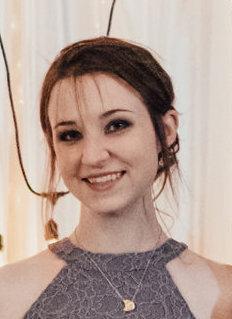Boyd wins Folsom Distinguished Master's Thesis Award
calendar icon24 Mar 2017 user iconBy Brian G. Reetz

With a true passion for the academic side of music, 2016 Glenn Korff School of Music Master of Music in Music History graduate Laney Boyd was recently selected to receive the 2017 Folsom Distinguished Master’s Thesis Award, presented by the University of Nebraska-Lincoln Office of Graduate Studies.
“I was ecstatic!” Boyd said upon being notified. “I received the e-mail letting me know I had won in the morning and I didn't stop smiling the whole day. I immediately told my husband, called my parents, and sent thank you e-mails to Dr. (Pamela) Starr and the other members of (my) graduate committee, Dr. Anthony Bushard and Dr. Jamie Reimer. I'm so thankful to have had the opportunity to work with these amazing professors.
“I think everyone was extra excited because this is the first time a GKSOM master's student was selected for the award. It still feels a little surreal!”
Boyd’s thesis is titled, "Uncanny Conversations: Depictions of the Supernatural in Dialogue Lieder of the Nineteenth Century."
In the Spring of 2015, Boyd took a survey course on the music of the Romantic era taught by Dr. Pamela Starr. Around the middle of the semester they studied a Lied by Robert Schumann titled "Waldesgespräch" ("Forest Conversation"). True to its title, the song takes the form of a verbal exchange between two individuals who come upon each other in a forest, one a noble knight, the other an evil witch disguised as a lovely young woman.
“The song was fascinating to me because the music itself distinguished the words of the knight and the witch without the need for two singers, or even for the soloist to change vocal quality,” Boyd said. “I voiced my interest in the song to Dr. Starr and she encouraged me to seek out other examples of supernatural dialogue Lieder. I was surprised by how many I found, and how different each composer's approach to musically depicting supernatural beings was. I asked Dr. Starr to be my thesis advisor, she agreed, and the project began in earnest!”
Starr said it was been a privilege to work with Boyd on her Master's thesis.
“At each stage, she demonstrated the qualities of imagination, intellectual curiosity, and commitment to high standards of scholarship and excellent writing skills that were on show during her work throughout her degree program,” Starr said, who is Professor of Music History at the Glenn Korff School of Music. “With this thesis, the capstone in our graduate program in Music History, Laney has shown us all that she is ready to take her place in the discipline. All of her instructors are very proud of her.”
Boyd spent two semesters working on her thesis. The first semester was almost solely devoted to research and analysis with a little bit of writing near the end. The second semester was all writing and revision.
“Researching, analyzing, and reading/writing about music is what really brings it alive for me,” Boyd, the 26-year-old Las Vegas native, who also received a Bachelor of Music Education degree with an emphasis in vocal/choral education from Southern Utah University in 2012.
About her thesis Boyd said, “During the nineteenth century many prominent German composers were producing huge numbers of art songs. Many of these songs' texts were poems that featured a dialogue between two characters. Sometimes these two characters were both human, but other times one character was human while the other was a supernatural being such as a witch, a ghost, or even the personification of death. Since Romantic art songs were almost always written for a single voice, the music itself had to distinguish between the two characters. Furthermore, in the case of a dialogue Lied featuring supernatural entities, the composer had to write the two characters in such a way that it was clear one speaker was human while the other was uncanny. In my thesis, I analyze six of these supernatural dialogue songs - three by Franz Schubert and one each by Robert Schumann, Gustav Mahler, and Hugo Wolf - and examine the compositional techniques the composers used to depict supernatural beings as opposed to mortals. The thesis also has a chapter that establishes a historical framework for supernatural dialogue Lieder through discussion of the origins of German Romanticism as well as the roots of supernatural themes and subjects in nineteenth-century poetry and music.”
Boyd and her husband (who also attended UNL) have decided to make Lincoln their home for the foreseeable future.
“I'm trying to stay as involved the arts as possible!” she said. “I'm currently working for a nonprofit arts management company called Arts Incorporated and writing program notes for the Lied Center's classical concerts.”
Boyd will be honored at the upcoming Graduate Studies Awards Luncheon on Wednesday, April 5 and recognized at the Hixson-Lied College Honors Day Dinner on April 22
On a side note, alum Kurt Knecht won the Folsom Award for his doctoral thesis in 2010.